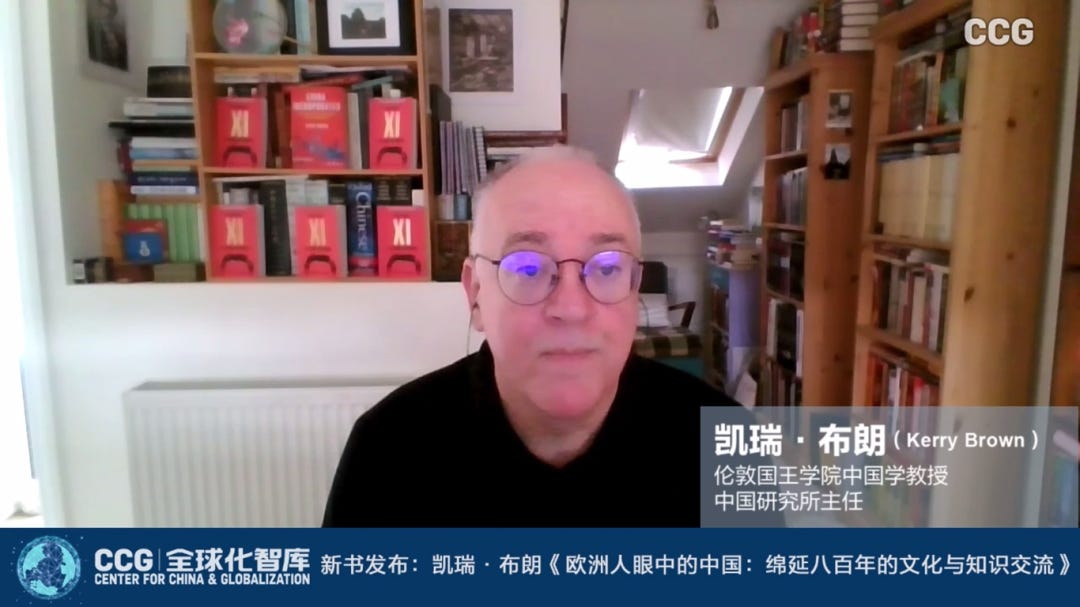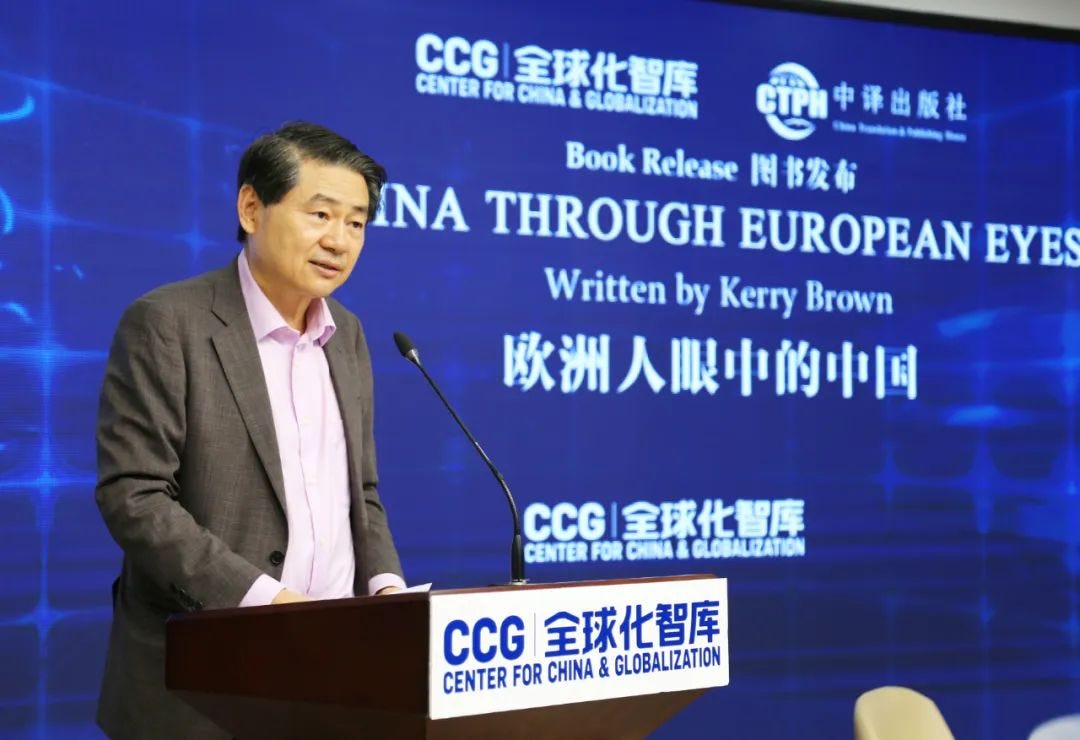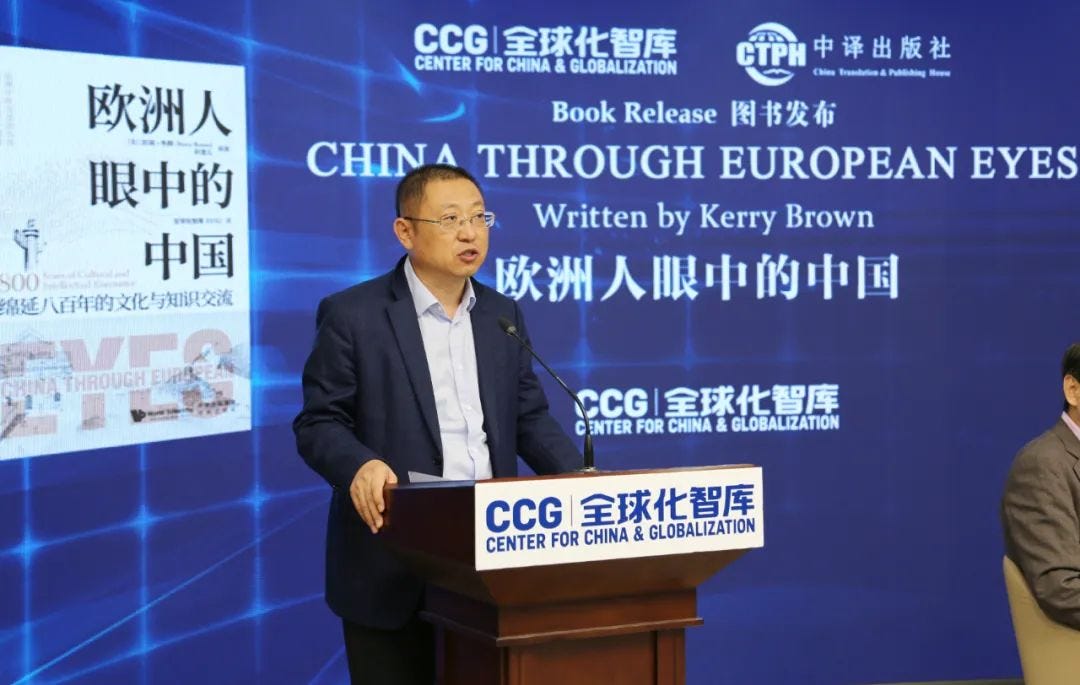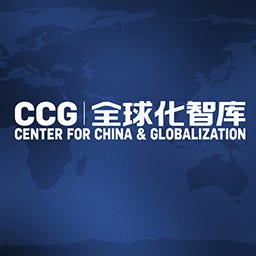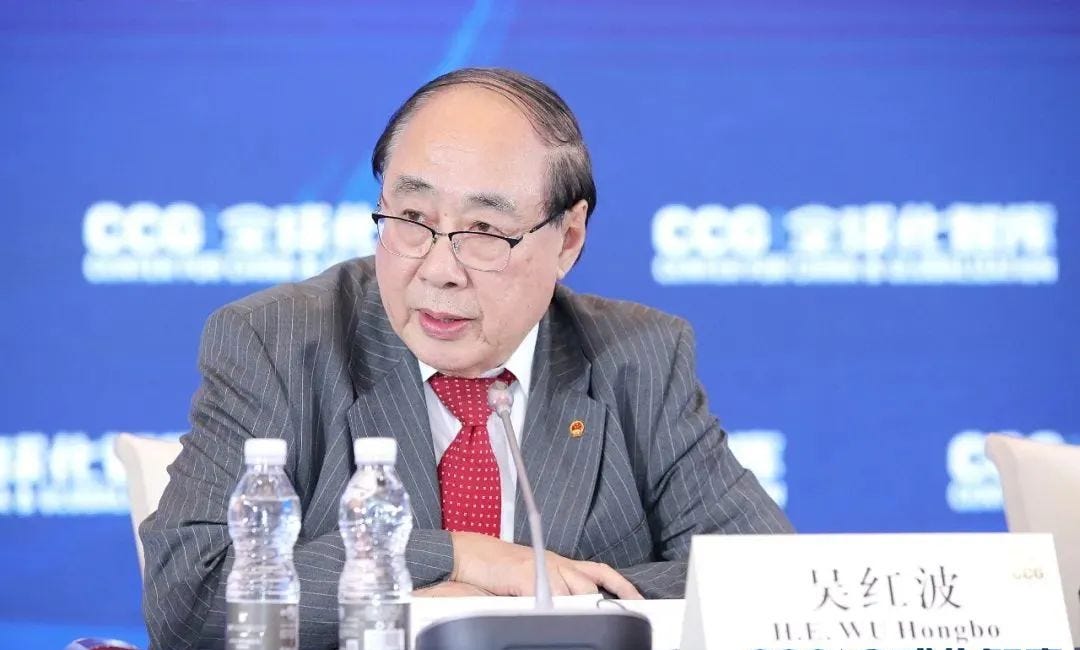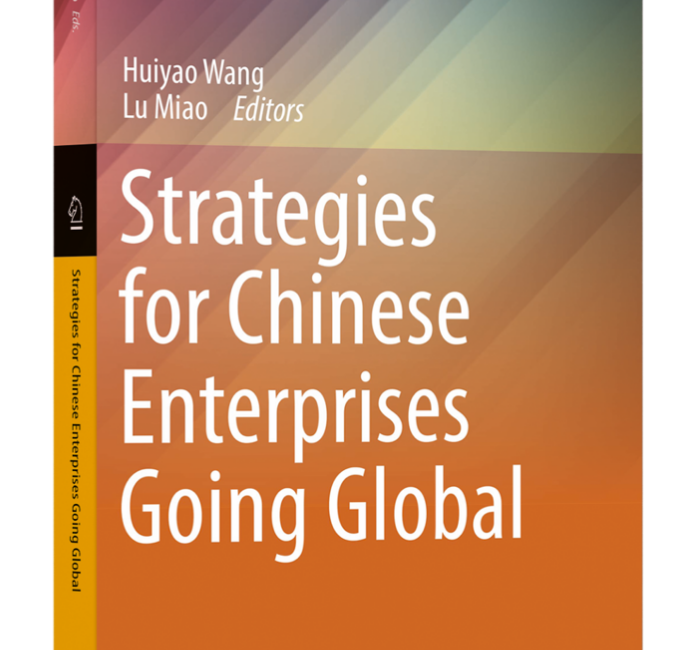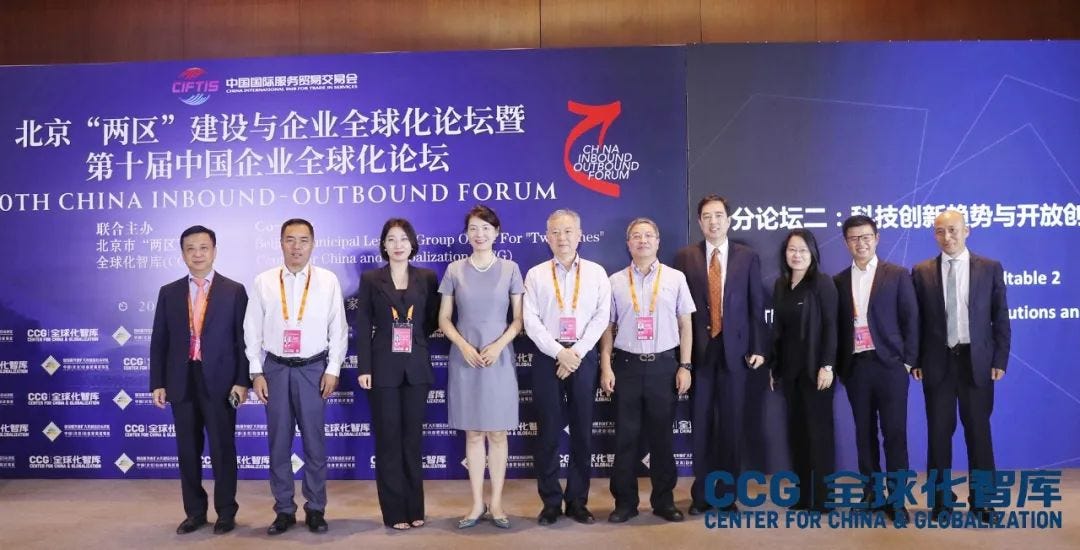Book Launch: "China Through European Eyes: 800 Years of Cultural and Intellectual Encounter" by Prof. Kerry Brown
Director of the Lau China Institute at King’s College London, translator representative, and head of publishing house unveil new book featuring perspectives of 16 prominent European thinkers on China
On Sept. 27, 2023, CCG and the China Translation & Publishing House were honored to launch《欧洲人眼中的中国:绵延800年的文化与知识交流》, the Chinese version of China Through European Eyes: 800 Years Of Cultural And Intellectual Encounter, authored by Professor Kerry Brown, Director of the Lau China Institute, at King’s College, London. The book was imported and translated by CCG, who is thrilled to see new ties forged between China and Europe as the China-EU comprehensive strategic partnership celebrates its 20th anniversary.
During the event, Professor Kerry Brown, the book's esteemed author, provided insights into the concept and structure of his work. Henry Huiyao Wang, Founder and President of CCG recounted his personal journey in bringing the translation to fruition and reaffirmed CCG’s commitment to global cultural exchanges. Additionally, Qiao Weibing, President and Editor-In-Chief of the China Translation & Publishing House, offered his interpretations of "China watchers" spanning eight centuries, emphasizing the importance of enhanced communication between China and Europe.
Multiple media outlets including People's Daily, Xinhua News Agency, China Daily, China Review News Agency, and China Newsweek were present at the book launch for interviews and coverage. The full video of the book launch is available on the official WeChat blog of CCG.
Professor Kerry Brown, Professor of Chinese Studies and Director of the Lau China Institute at King’s College, London
The European and Chinese history is an important history, and I hope in the future to be able to write a complete history of that whole period. But this is a first step. And as in the introduction from Dr. Wang, his colleague, what I've done with my co-author Chenger Deng, is to take 16 representative figures from the last 800 years, some of whom are extremely well known, and some of whom may be less well known, but all who had a significant voice in the relationship between Europe and China.
Of course, over this history, Europe has been many different things, and China has been many different things. And so this is a kind of history of different places for China. It was originally the Yuan, then the Ming, then the Qing. Of course, now it's the People's Republic. And for Europe, it was many, many different countries, many different states, a long time for the current shape of Europe to emerge.
So despite big differences between the two, I found that there are some predictable attitudes that Europeans showed towards China. The figures that I have concentrated on are significant intellectual figures in Europe, people like Leibniz, the philosopher, people like Montesquieu, who wrote a book that influenced America in its foundation. People like Voltaire, Marx, Max Weber, the great sociologist, Bertrand Russell, who visited China in the early 1920s, the philosopher. All of these figures were not China experts, by any means, but they had a strong interest in China, and they thought it was worth knowing about as a place and as a culture. And I think that is important. They were people who went out of their way to understand what China was. Despite the fact that at the time that many of them were writing, not much was really known about the country and its people and its ideas and beliefs.
So for these people, I think that there have been historically three broad positions. There are those who are very idealistic about China. I would say that Voltaire, the French philosopher from the 18th century, was, early in his career, very idealistic about China. There are those who are very pessimistic about China and critical — Montesquieu was an example also from the 18th century.
And then really, in the middle, I think the most important group, people like Leibniz, who really tried to get evidence for what they thought. They looked at China and tried to understand and they tried to see China clearly, and then make some conclusions. So they were very scientific in their approach. I think today in Europe, we still have those three approaches, particularly at the moment. We have those who may be idealistic about china and expect too much from China. We have those who are over pessimistic — maybe blame china too much and give China too much influence over them, which probably it doesn't want and it doesn't feel that it has. And then there are the group in the middle who are just trying to see and understand. And I think that that work is extremely important for our work today. So I have hopefully put in this book, some ideas for how Europeans can understand the long path they have come to in understanding and trying to appreciate China, and maybe how they can help use that history today.
I think that it's important to remember that history to try and understand that history, and I hope that’s what this book has done. And I hope it helps Chinese colleagues and friends, now that it's translated into Chinese, for them to understand how much over the last 800 years Europeans have tried to think, understand, and kind of embrace China and how much it has become a part of our intellectual tradition.
Thank you very much!
Henry Huiyao Wang, Founder and President of CCG
In 2021, I had already an active dialogue with Prof. Brown, and that was actually during the COVID. There was little cultural exchanges. I thought he mentioned that he had been writing and compiling a new book on European views on China and compiling together about 16 important European thinkers, the insights of them from the time of Marco Polo to the 1970s, to explore the extensive history of exchanges between Europe and China.
So this is really interesting. And how in both sides during those difficult time, I mean, COVID, is one of the most difficult periods, but also even now. And to understand better the past, the present, and future, and gaining a clear understanding of the current positions can help us make wiser decisions. So I'm very interested in this book, and we actually got the opportunity to import this book, and then we have the publisher to translate the book. In May of 2022, CCG had actually finished translating of this very important book into Chinese and delivered the manuscripts to the China Translation & Publishing House, which is a very good publishing house. After the English edition was published last April, we noticed that there's a lot of Chinese press mentioning this book. Actually, Prof. Kerry Brown has given a long full-page interview to the Global Times.
So I think this English edition was published by world scientific internationally. And of course, CCG was also able to host a jointly hosted launch on this valuable book. From my point of view, actually, Prof. Kerry Brown is not only a sinologist, an expert on China, but also a diligent educator, a diligent bridge-builder who promotes understanding and bridges differences between China and the world. I think this is also due to his largely global views and also his personal experience in China. He also actually contributed to another book that I edited: Consensus or Conflict? China and Globalization in the 21st Century, which is an English book that we gathered about 37 global opinion leaders and former statesmen and think tankers and many prestigious authors and published by Springer Nature as part of the China and Globalization CCG book series. This series actually also seeks to create a balance, a global perspective by gathering the views of highly influential scholars, participants and opinion leaders on policy from China and around the world.
What has truly influenced the trajectory of Western policy towards China? One important factor is that Western world knows not much, maybe not really enough about China. So in this book that we're currently publishing, China Through European Eyes, Kerry actually presents an important viewpoint for the most of the writers of this collection, talking about and engaging with issues relating to the China existing in the time with an act of choice, which for people in the 21st century is increasingly a necessity. So if one doesn't go to find China, it will almost inevitably come to find one. So she's very attaches great importance to the experience on China. So to be back in china, Europe, two largest civilizations, of course, very deep, profound civilizations, the importance of relation between China and Europe cannot be overstated as the Chinese idiom goes, take the history as a mirror. So from Kerry Brown's China Through European Eyes, I think writers will find that the East differs, of course, in many ways from the West, not only the social political customer, but also in cultural and intellectual traditions.
Historically, Chinese culture and values have been influenced by many different ethical, philosophical and religious views, forming a flexible worldview that is difficult to label. I think Prof. Brown has actually detected this difference. For most of the history, people in places like the UK and the U.S. have not adequate desire, probably, to understand China. So it is important that we have Prof. Brown to call for more attention paid between the exchanges between West and China, and to know better the culture and history of each other. And this is really important as we are facing, particularly in China, the only language is Chinese and not in the advantage of Western languages like English.
So I think that this book is very good for Chinese readers to have a better understanding of how Europeans in the past interpreted China, their own experienced on China, including eight people who have actually come to China. Eight people have not come, but they have also read through other literature on China. So this is really rather interesting. The Center for China & Globalization being one of the largest independent think tanks in China, we've been really building up the bridges, we've been conducting dialogues, we've been talking to the global opinion leaders - I mean, Kerry has already been in dialogue with us for several times. We have been, in the past two or three years during the pandemic, talked to over 50 global opinion leaders and scholars around the world. And we found that it is important to have the books, to have the ideas, to have the knowledge be transferred, to transcend the boundaries between China and the world.
So for this again, I would like to thank Kerry for taking the time and really introducing his latest book which is published in Chinese to the Chinese readers. So I will really also appreciate all the attendees today and we hope that we'll have some questions from our audience and media friends. Thank you.
Qiao Weibing, President and Editor-In-Chief of the China Translation & Publishing House
I am thrilled and honored to be back at CCG, reuniting with Mr. Kerry Brown and President Wang Huiyao, to celebrate the official release of the Chinese version of "China Through European Eyes: 800 Years of Cultural and Intellectual Encounter."
I want to extend my gratitude to President Wang for inviting me to be part of the 15th-anniversary celebration of CCG just two days ago. Today, we gather again to mark the official launch of this new book, underscoring President Wang's deep appreciation for Prof. Kerry Brown's work. I recall that a year and a half ago, we were in Beijing witnessing the release of the English version of "China Through European Eyes." After rigorous collaborative efforts, the Chinese edition of the book has now hit the shelves. This year coincides with the 20th anniversary of the comprehensive strategic partnership between China and the EU. Through this book, we genuinely hope to engage with you all in discussions on diverse topics, such as the disparities between Chinese and Western civilizations, contemporary China-Europe relations, and global political and cultural issues. Now, let me share some reflections based on my involvement in the book's editorial process.
This book holds high academic and historical value.
Prof. Kerry Brown is a distinguished scholar known for his narratives of "Eastern stories," and he has a longstanding partnership with China Translation & Publishing House. Starting from "A Tale of Five Chinese Cities – 五城记," which chronicles his firsthand experiences in five Chinese cities in 2020, to "China Through European Eyes," which delves into the perceptions and understanding of China by 16 "observers" and "participants" over an 800-year period.
This book features Prof. Brown's choice of 16 influential Western figures from diverse backgrounds, including businessmen, travelers, missionaries, diplomats, thinkers, philosophers, and writers, to study their perspectives on China from varying angles and across different eras.
One group consists of "observers" who actually set foot in China, such as Marco Polo, whose "The Travels of Marco Polo" provides a compelling starting point for understanding China as a land of prosperity, filled with song and dance and streets paved with gold. Another notable figure is Matteo Ricci, an Italian missionary considered one of the pioneers of China-Western relations. He arrived in Macau at the age of 20 and made China his home, demonstrating that while challenging, it was entirely possible to deeply engage with Chinese thought and culture while maintaining a European worldview and perspective. Not to forget Simone de Beauvoir, the feminist movement's trailblazer, whose "The Second Sex" continues to wield considerable influence in China; and Julia Kristeva, another feminist author, who asserted in "About Chinese Women" that China acknowledged women's legitimate rights as early as 1950 with the Marriage Law of the People's Republic of China.
The other category encompasses "observers" who never set foot on Chinese soil, nor in East Asia, but relied on texts and documents left by their predecessors. They sought to learn about and imagine China by using foreign-language versions of Chinese classics, avoiding unfounded speculations or judgments. Take, for instance, the renowned psychologist Carl Jung, who was captivated by the English translation of the "I Ching" and held deep admiration for China. The German mathematician and scientist Gottfried Wilhelm Leibniz keenly perceived the similarities and commonalities between calculus and the sixty-four hexagrams in the "I Ching." The French Enlightenment philosopher Voltaire not only adapted the Chinese drama "The Orphan of Zhao" into the play "L'Orphelin de la Chine" but also believed that China was a nation characterized by diversity and inclusivity. Last but not least, Karl Marx's influence on China is immeasurable, who believed that China was an indispensable part of the global system.
Through the thoughts, observations, and experiences of these 16 representative figures, Prof. Kerry Brown has explored China, spanning from first contacts in the 13th century during Marco Polo's era, through deeper understanding in the European Enlightenment period, to contemporary new perspectives on China. These diverse viewpoints, marked by realism and critical rationality, reflect the spirit of Europeans in that era and hold significant academic and historical value for our understanding of today's world.
The book bears substantial practical and international significance.
Currently, the global landscape is characterized by dynamic changes, including various "de-globalization" trends and "decoupling" issues that permeate the international stage with a high degree of uncertainty.
Against the backdrop of the 21st-century "Clash of Civilizations," views of China from Europe, the United States, and other countries are increasingly oscillating between different positions. One of the ways to address these contradictions may be to find valuable lessons in this book. By carefully studying the captivating content of this book, we may be able to seek out an alternative approach to analyzing and considering China-Europe civilization and bilateral relations in today's world.
How to understand contemporary China, whether in Europe or on the global stage, generally falls into three categories of viewpoints: first, the idealists (those who believe China surpasses Europe); second, the realists (those who advocate for a pragmatic, fact-based approach); third, the universalists (those who view Europe as a model for current and future human development).
Faced with these different perspectives, and given the intricate and complex international landscape, both China and Europe should adopt a stance of learning from history and from ancient wisdom. We should strive to find common ground while recognizing differences, seeking a deeper understanding of each other, embracing a more inclusive, diverse, and scientific spirit. Together, we can work towards global peace and development.
Two Suggestions for the Future
In the long run, the mixed nature of the Chinese worldview, the similarities and differences between China and Europe, and China's portrayal in Western imagination are all topics deserving of ongoing exploration. Analyzing and understanding contemporary China from multiple perspectives can not only enrich readers' knowledge but also help them discern right from wrong, providing valuable and insightful humanistic reflections. With this in mind, we hope that this book will guide readers to draw wisdom from past exchanges, deepen mutual understanding and cooperation, and offer new ways of thinking about resolving "Clashes of Civilizations," reconciling geopolitical conflicts, rebuilding the international order, and facilitating cross-cultural understanding.
In the future, lessons must be drawn from history to innovate and deepen cooperation, and further enrich the forms of exchange and mutual learning between Chinese and Western civilizations. In light of the publication of "China Through European Eyes," and in response to the proposal I made at last year's English book launch event, I propose:
First, based on the dialogue and exchange between Chinese and European civilizations, conduct in-depth research on the origin and development of modern China, exploring its historical trajectories and contemporary issues. We should gather a group of outstanding European entrepreneurs, economists, politicians, travelers, and writers, among others, to provide fresh modern perspectives on contemporary China.
Second, we can also organize experts in Chinese-European history and European studies to write a book titled "Europe Through Chinese Eyes." This book can encompass both the past and present of Europe, thus enhancing mutual exchange and understanding between Chinese and Western civilizations, and contributing to global harmony and development.
We sincerely thank Prof. Kerry Brown for bringing such an excellent work to Chinese and global readers. We look forward to Prof. Brown's new works in the future!
Finally, I wish today's book launch event great success! I also hope for continued close and friendly collaboration with Prof. Kerry Brown and CCG in the future!
Thank you!






